5 women who should be on U.S. currency
It's time

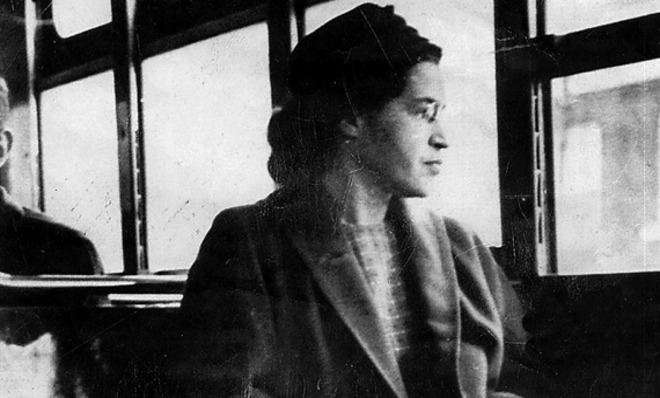
A free daily email with the biggest news stories of the day – and the best features from TheWeek.com
You are now subscribed
Your newsletter sign-up was successful
When speaking in Kansas City, Missouri last week, President Obama talked about a letter he received from a young girl asking why there aren't more women on U.S. currency. She offered him "a long list of possible women to put on our dollar bills and quarters and stuff, which I thought was a pretty good idea," Obama said.
This girl is not alone. Last year British feminists fought hard to keep a woman on their banknotes, and eventually won when the Bank of England decided to replace 19th century philanthropist Elizabeth Fry with Jane Austen — not Winston Churchill, as originally intended — on the 10 pound bill.
Canadian women launched a similar campaign last year to pressure their national bank to feature women besides the Queen of England on their currency. In 2011 a group of feminist women known as the "Famous Five" and Thérèse Casgrain, the first female leader of a political party in Canada, were bumped from the $50 bill, and replaced by a boat — the Arctic icebreaker Amundsen.
The Week
Escape your echo chamber. Get the facts behind the news, plus analysis from multiple perspectives.

Sign up for The Week's Free Newsletters
From our morning news briefing to a weekly Good News Newsletter, get the best of The Week delivered directly to your inbox.
From our morning news briefing to a weekly Good News Newsletter, get the best of The Week delivered directly to your inbox.
Here in the U.S. women appear on three coins: Helen Keller on a quarter, and Sacagawea and Susan B. Anthony on dollar coins. But no woman has appeared on paper currency since Martha Washington's face graced the front of $1 silver certificates in the late 19th century. Instead, our bills feature only white men's faces. There has never been an African American on any U.S. currency.
According to the U.S. Department of Treasury website, the secretary of the Treasury is responsible for overseeing the production of the bills, and has been since 1862 when Congress accorded them this power.
As Treasury explains:
It was determined that portraits of presidents of the United States have a more permanent familiarity in the minds of the public than any others. This decision was somewhat altered by the secretary of the Treasury to include Alexander Hamilton, who was the first secretary of the Treasury; Salmon P. Chase, who was secretary of the Treasury during the Civil War and is credited with promoting our National Banking System; and Benjamin Franklin, who was one of the signers of the Declaration of Independence. All three of these statesmen were well known to the American public.
Treasury Department records do not reveal the reason that portraits of these particular statesmen were chosen in preference to those of other persons of equal importance and prominence. By law, only the portrait of a deceased individual may appear on U.S. currency and securities. [MoneyFactory.gov]
So according to their rules and precedents, the three requirements for appearing on money are being familiar to the general public, having contributed to American democracy, and being dead. I can think of many women who fit the bill.
A free daily email with the biggest news stories of the day – and the best features from TheWeek.com
Why is this necessary? Because we are shaped and guided by the stories we tell ourselves from our past. Educators have worked hard to incorporate more stories about women into history books over the last quarter century. This has been great, but there is symbolic, even subliminal, value to having women on money that history classes can't compete with. Seeing a woman's face on the front of a bill would create a strong associative bridge to one of the biggest emblems of power there is.
In an attempt to begin a productive conversation, and not create a definitive list, I have narrowed down five currency-ready women.
1. Rosa Parks
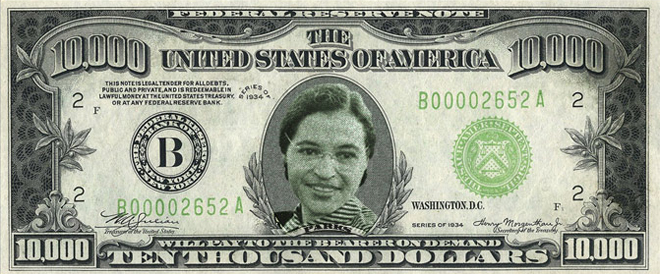
In 1955, she refused to give up her seat to a white man on a bus in Montgomery, Alabama, launching a boycott that fired up the Civil Rights movement. She is called "the first lady of civil rights" and received the Presidential Medal of Freedom.
2. Susan B. Anthony
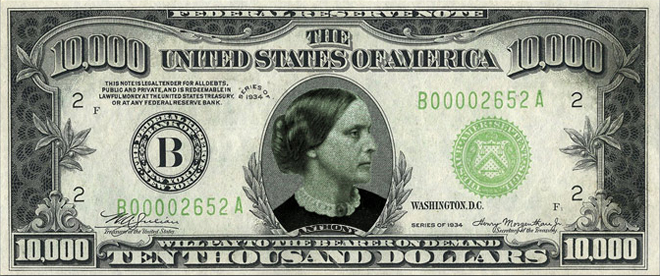
Both an abolitionist and a suffragist, Anthony was a lifetime devotee of equal rights. She was president of the National American Woman Suffrage Association, and worked alongside fellow feminist Elizabeth Cady Stanton for women to be able to own property and vote.
3. Eleanor Roosevelt
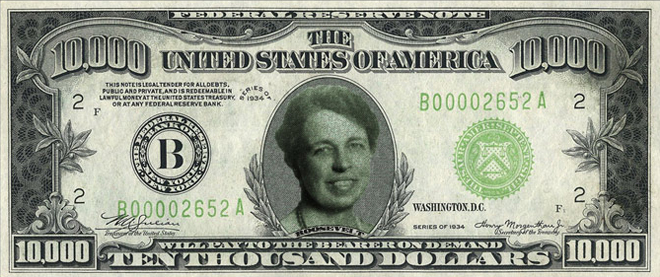
Roosevelt redefined what it meant to be first lady, and regularly gave press conferences and wrote a newspaper column during her husband's presidency advocating for women and the poor. Her interest in policy reform stayed with her throughout her life, and later on she served as a delegate to the United Nations General Assembly, where she helped write the Universal Declaration of Human Rights.
4. Harriet Tubman
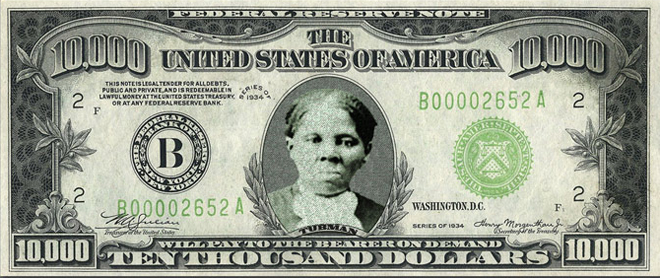
After escaping slavery herself, Tubman became a leading abolitionist and helped hundreds escape as a conductor of the Underground Railroad — a network of safe houses that escapees could seek refuge in as they made their way up north. During the Civil War, Tubman worked for the Union Army as an armed scout and a spy, and was the first woman to lead an armed expedition in the war, one that liberated 700 slaves.
5. Abigail Adams
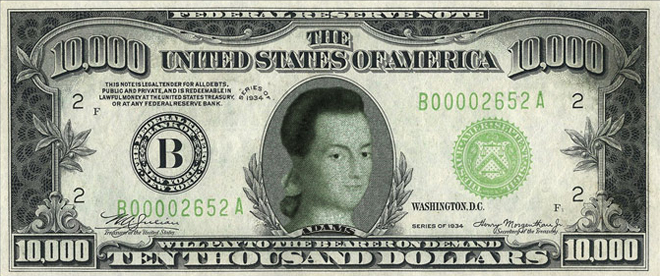
Wife of President John Adams, the nation's second first lady was an early advocate for women's rights and public education and had a strong influence on her husband. The couple maintained an ongoing correspondence over the years, and their letters are filled with high-level discussion and debates about government and politics. "Do not put such unlimited power into the hands of the husbands. Remember all men would be tyrants if they could," she urged him.
Illustrations by Lauren Hansen, portraits courtesy Wikimedia Commons, money courtesy Blue Lightning TV.
Elissa Strauss writes about the intersection of gender and culture for TheWeek.com. She also writes regularly for Elle.com and the Jewish Daily Forward, where she is a weekly columnist.
-
 El Paso airspace closure tied to FAA-Pentagon standoff
El Paso airspace closure tied to FAA-Pentagon standoffSpeed Read The closure in the Texas border city stemmed from disagreements between the Federal Aviation Administration and Pentagon officials over drone-related tests
-
 Political cartoons for February 12
Political cartoons for February 12Cartoons Thursday's political cartoons include a Pam Bondi performance, Ghislaine Maxwell on tour, and ICE detention facilities
-
 Arcadia: Tom Stoppard’s ‘masterpiece’ makes a ‘triumphant’ return
Arcadia: Tom Stoppard’s ‘masterpiece’ makes a ‘triumphant’ returnThe Week Recommends Carrie Cracknell’s revival at the Old Vic ‘grips like a thriller’
-
 The billionaires’ wealth tax: a catastrophe for California?
The billionaires’ wealth tax: a catastrophe for California?Talking Point Peter Thiel and Larry Page preparing to change state residency
-
 Bari Weiss’ ‘60 Minutes’ scandal is about more than one report
Bari Weiss’ ‘60 Minutes’ scandal is about more than one reportIN THE SPOTLIGHT By blocking an approved segment on a controversial prison holding US deportees in El Salvador, the editor-in-chief of CBS News has become the main story
-
 Has Zohran Mamdani shown the Democrats how to win again?
Has Zohran Mamdani shown the Democrats how to win again?Today’s Big Question New York City mayoral election touted as victory for left-wing populists but moderate centrist wins elsewhere present more complex path for Democratic Party
-
 Millions turn out for anti-Trump ‘No Kings’ rallies
Millions turn out for anti-Trump ‘No Kings’ ralliesSpeed Read An estimated 7 million people participated, 2 million more than at the first ‘No Kings’ protest in June
-
 Ghislaine Maxwell: angling for a Trump pardon
Ghislaine Maxwell: angling for a Trump pardonTalking Point Convicted sex trafficker's testimony could shed new light on president's links to Jeffrey Epstein
-
 The last words and final moments of 40 presidents
The last words and final moments of 40 presidentsThe Explainer Some are eloquent quotes worthy of the holders of the highest office in the nation, and others... aren't
-
 The JFK files: the truth at last?
The JFK files: the truth at last?In The Spotlight More than 64,000 previously classified documents relating the 1963 assassination of John F. Kennedy have been released by the Trump administration
-
 'Seriously, not literally': how should the world take Donald Trump?
'Seriously, not literally': how should the world take Donald Trump?Today's big question White House rhetoric and reality look likely to become increasingly blurred
